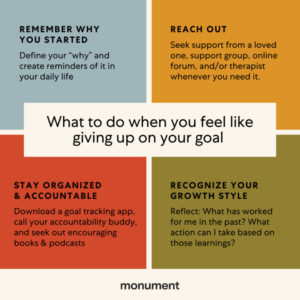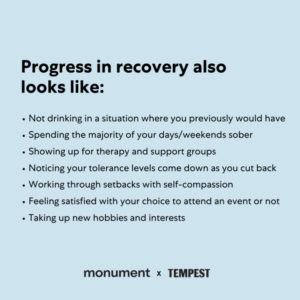‘Relapse’ is a very common concern for those diagnosed with alcohol use disorder (AUD), a medical condition characterized by drinking more than you want to, for longer than you want to, despite negative consequences. AUD is recognized by the American Psychiatric Association as a chronic, treatable condition. This means that while sobriety is well within reach for a person diagnosed with AUD, it typically requires ongoing effort to maintain, and setbacks can be part of that journey.
Relapse is a normal part of the recovery journey, and shouldn’t be a point of shame. Having a setback in your sobriety does not minimize your progress to date, or impact your ability to achieve your long-term goals. Here’s a helpful analogy: if you had a blackbelt in karate, would losing a match take away that accomplishment, or your ability to win your next one? The answer is no. Setbacks happen, which is why we have to prepare for them, and persevere. Below I will share more about what a relapse looks like and what to do if one occurs. Plus, I’ll share tips on how to proactively prevent relapse on your sobriety or moderation journey.
What is a Relapse?
Many people are initially unaware that there are two different definitions related to relapse: lapse and relapse.
“Lapse”
By definition, lapse refers to a temporary failure of concentration, judgment, or memory. In the recovery world, a “lapse” (also commonly referred to as a “slip”) is a single instance of drinking after being abstinent. It’s a temporary circumstance that has little, if any, impact on a person’s journey of sobriety. Oftentimes individuals who experience a lapse are able to identify the slip and revert back to their sobriety goals, and use their tools successfully. Although lapses can be temporary, it’s important to recognize that they can also progress into relapse if left unaddressed.
“Relapse”
By definition, relapse refers to a state of deterioration following a time of improvement. A “relapse” in recovery often describes a return to problematic drinking after a period of sobriety or moderation. Relapse often occurs when someone loses touch with their treatment plan and typically involves more serious consequences. Relapse may lead to a return to risky behavior, harm to personal or professional relationships, or a setback in health outcomes. However, a relapse doesn’t mean that the previous progress has been erased entirely, or that an individual can’t return back to a lifestyle of sobriety or moderation.
How Common is Relapse?
Research concludes that 40-60% people seeking sobriety will relapse at some point along their journey. This statistic can be very intimidating for people newly exploring the idea of sobriety. However, experiencing a relapse doesn’t mean that sobriety isn’t possible. Research concludes that while over 30% of people relapse during their first year of sobriety, as time progresses, the rate of relapse decreases significantly: 21.4% of people relapsed in their second year of sobriety, 9.6% of people relapsed after three to five years of sobriety, and only 7.2% of people relapsed after five years of sobriety. Working through a relapse is a very common and even helpful way to grow stronger in your sobriety, and to learn how to reduce the risk of one occurring again. To anyone exploring sobriety – know that like many things in life, sobriety can be a hard journey, but is an incredibly worthwhile one.

Stages of Relapse
The phrases ‘emotional relapse’ and ‘mental relapse’ are often used to describe the psychological lead-up to the act of drinking again (‘physical relapse’). It’s important to keep in mind that while the experiences associated with ‘emotional relapse’ and ‘mental relapse’ can indicate an increased risk of physical relapse, they don’t have to lead to drinking, and they are not an indication of failure or weakness. The stages below can be seen as helpful indications that it’s time to lean into your recovery tools and recommit to your goals.
Emotional Relapse
In emotional relapse, a person may not be actively contemplating drinking, but their behaviors are reminiscent of those from when they were drinking. Signs of emotional relapse are often rooted in poor self-care, which can look like isolating oneself, bottling up emotions, missing meetings or treatment appointments, and hyperfocusing on others and their problems instead of oneself.
Mental Relapse
In mental relapse, thoughts of drinking are present and are deliberated inside of a person’s mind. During a mental relapse, someone also may be experiencing heightened alcohol cravings, active thoughts about people, places and activities associated with drinking, minimizing the consequences of drinking, romanticizing drinking, and planning to drink.
Many of these symptoms, like alcohol cravings and thoughts about alcohol, can’t be prevented. There’s no shame in experiencing these things – the important step is to view them as signals that it’s time to re-engage in your treatment and sobriety toolkit. In alcohol therapy, you can meet with a specialized therapist, such as myself, to work through these aspects of recovery so that you can identify and manage mental relapse and recommit to your goals.
Physical Relapse
As mentioned, the final stage is the actual physical relapse, where a person returns to the problematic drinking that they seek to abstain from or moderate. Identifying if you’re experiencing an emotional or mental relapse can help prevent physical relapse from occurring. Let’s dive into some other warning signs to watch out for.
Triggers and Warning Signs of Relapse: What to Look Out For
Relapses typically don’t happen out of nowhere. There are usually multiple factors that build up over time and result in a relapse. Some of these signs include:
- Heightened unpleasant emotions, such as anxiety, depression, frustration, or boredom.
- Intensely pleasurable emotions, such as happiness or excitement, as well as particularly pleasurable events like holidays, birthdays, and sporting events.
- Stress stemming from work, home life, romantic relationships, or friendships.
- Social pressures, such as being around others who are drinking or talking about drinking.
- Feelings of boredom or feeling the urge to “escape.”
- Isolation and limited contact with friends, family, and support network.
- Exposure to triggers, such as reconnecting with people who are linked to past drinking, or revisiting bars or other social settings where drinking took place.
- Romanticizing drinking and assigning positive feelings (i.e.: fun, exciting, happy) to past instances of drinking.
- Not taking prescribed medication for managing drinking.
Experiencing any of the above does not mean that a person will relapse, especially if they are aware of these factors and can look out for them. This is one of the most important parts of a Relapse Prevention Plan.

How to Prevent a Relapse
Sobriety is not a “one size fits all” process. Tailoring a personalized Relapse Prevention Plan can help you identify what works for you to manage triggers and cravings, and ultimately avoid relapse. Here are several ideas I often share with patients:
- Know Your Triggers: Make an actual list of your internal (i.e.: thoughts, feelings) and external (i.e.: people, places) triggers. Once listed, consider and pair at least one healthy coping skill to each trigger.
- Make a List: Grab an index card and on one side, make a list of the benefits of sobriety. On the other, list the cons of drinking. Store your card in your wallet or purse, or keep a copy on your phone, so that it goes where you go (i.e.: social situations, traveling, work functions, home), and use it as a check-in whenever sobriety feels challenging.
- Emphasize Self-Care: Simply put, do more of what you love. Make the time to enjoy your hobbies and try scheduling intentional time for self-care as you would any other engagement.
- Use the “HALT” Technique: HALT stands for Hungry, Angry, Lonely and Tired. When experiencing a craving or trigger, ask yourself if you are experiencing any of these things. If so, work to directly meet the presenting need (i.e.: get some sleep, prepare a healthy meal, phone a friend). This often helps reduce cravings!
- Make an Emergency Contact List: Talk to your support network and establish a person or two to call when you are struggling with managing a trigger or craving. You can also explore alcohol support groups you can join whenever you need some extra support. Having people to help “talk you through it” can be instrumental in deterring a physical relapse.
- Use Grounding Techniques: There are many techniques to choose from that can help you re-center and focus on your goals. A common one is to acknowledge 3 things you can see, 2 things you can touch, and one thing you can smell.
- Join Monument: Monument is an online alcohol treatment platform where you can gain access to a community of other people working to change their drinking habits. You can also explore treatment options like medication to stop drinking and therapy.
While these tips are a great launching point, everyone’s needs are unique. I recommend you work with a specialized therapist to develop your own toolkit, and dive into specific tactics that will empower your success.

What Do I Do If I Relapse?
Relapse does not indicate failure. It’s helpful to look at relapse as an opportunity to learn more about your risk factors, with the ultimate goal of learning new ways to successfully avoid reoccurrence. Acceptance is key in this process, as are the following:
1. Avoid Negative Self-Talk
It’s normal to experience disappointment or frustration after a relapse. However, staying fixated on these feelings can prevent you from focusing on your goals and moving forward. Try to avoid speaking or writing (in a text or call to another person, or in a journal entry) negativity in relation to yourself and your relapse.
2. Seek Support
Many people feel the urge to isolate after a setback, but remember that isolation and depression can contribute to relapses occurring again. Instead, relapse is a sign to dig deeper into your sobriety toolkit. Reach out to your therapist, post in the Monument community forum, phone a sober buddy or ally, or join a support group. Getting in touch with your support system will help you remember that relapses can be overcome and you have a whole community ready to support you.
3. Review What Went Wrong
With self-compassion, take time after a relapse to identify where you may have entered emotional or mental relapse. Were there any signs and risk factors leading up to the lapse or relapse? Approach this part of the process like a researcher, gathering evidence so that things can be improved. Reflect and make note of the thoughts, behaviors, and actions that led to the relapse, and use these to strengthen your Relapse Prevention Plan.
4. Recommit to Sobriety
By recommitting to sobriety, you recognize that sobriety is a marathon, not a sprint. You can remind yourself that one relapse doesn’t dictate your future. This is a journey of progress, not perfection.
If you’ve experienced a relapse or are nervous about one occurring in the future, you are not alone. Even just reading this article today is an incredible step towards growing stronger in your sobriety. Choosing sobriety is an incredible decision, and one that can be made over and over again. The clinicians on the Monument platform are ready to help support you at every step.
Sources:
- The Recovery Village. “Alcohol Stats: Quick Facts About Alcoholism & Treatment.” https://www.therecoveryvillage.com/drug-addiction/drug-alcohol-use-rising-during-covid/. Accessed August 6, 2022.
- The Recovery Village. “Alcohol Relapse Rates & Abstinence Statistics.” https://www.therecoveryvillage.com/alcohol-abuse/alcohol-relapse-statistics/. Accessed August 6, 2022.
- DrugFree.org. “What’s the Difference Between a Slip or Lapse and Relapse?” https://drugfree.org/article/whats-difference-slip-lapse-relapse/. Accessed August 6, 2022.
- Melemis SM. Relapse Prevention and the Five Rules of Recovery. Yale J Biol Med. 2015 Sep 3;88(3):325-32. PMID: 26339217; PMCID: PMC4553654.
